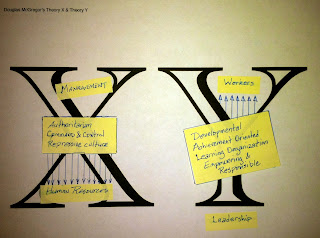
Have you heard of Douglas McGregor's two theories on motivation of humans?
In the 1960s McGregor proposed two competing theories on motivation and management of people.

Theory X was based in the assumption that employees don't like work, don't want to be at work, would goof off if they could, and must be coerced to higher performance.
Theory Y was based in the assumption that employees do like their work, are intrinsically motivated, can be creative, seek responsibility, and exercise self-direction and self-control.
McGregor was basing his two theories on Maslow's hierarchy of needs (lower order to higher order needs: physiological, safety, social, esteem, self-actualization). With the assumption that Theory X was concerned with the lower order needs (physiological & safety) while Theory Y was concerned with the higher order needs (esteem & self-actualization). McGregor didn't believe there was a continuous continuum. That perhaps motivation was bi-modal.
Which leads into Frederick Herzberg's Two-Factor Theory. Basicly the higher order needs lead to motivators, where as the absences of lower order needs lead to dissatisfction - which is not a single continuum, but rather a dual continuum (see graphic).
By the way, you have McGregor to thank for the term "human resource".
So which are you? Does it depend on the situation? Would you want a Theory X or Y ship captain when you hit an ice-berg?
 |
| McGregor's Theory X & Y |
Opening keynote: Niels Pflaeging - Bye-bye Management!
Some interesting links on Motivation.
Organize for Complexity - Keynote by Niels Pflaeging at Agile Telekom Convention 2015
See Also:
Douglas McGregor - The Human Side of Enterprise Annotated Edition on Amazon
Bandura’s article "Toward a Psychology of Human Agency" defines human agency and describes the underlying psychological process.


Comments